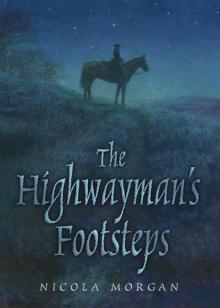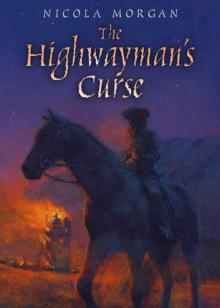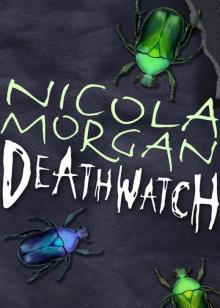- Home
- Nicola Morgan
The Highwayman's Curse Page 13
The Highwayman's Curse Read online
Page 13
Bess was crouched against the wall, surrounded by scattered packages. The snake was nowhere to be seen.
“It’s in the box,” she muttered. Her voice sounded thread-thin, ready to snap, her breathing fast and shallow. I fought to control my fears – the bite from a snake in this country would not usually kill, I thought, but I was not sure.
She looked up at me as I crouched beside her. “It’s my hand,” she whispered, holding her left wrist in her right. I raised it and held the torch near by. Two tiny puncture marks sat on the fleshy part under her thumb. “I can’t see properly, Will,” she said. “I’m going blind!”
I pulled her hand to my mouth and clamped my lips over the puncture wounds, sucking as hard as I could, then spitting, spitting, spitting over and over again onto the floor. I knew not what else to do. I could see that her hand was swollen, her wrist too. Then a sudden memory came to me of one of my father’s stablemen doing something when a hound was bitten by a snake. I needed a knife.
Peering around with the torch, I found the blade she had been using to break open the box. Holding my breath and clenching my teeth, I quickly slashed her hand, just above the snake bite. She gasped and snatched her hand away. Blood pumped out. Placing the torch against the side of the box, I whipped the kerchief from my neck and tore it into two pieces. One I quickly bound round the highest part of her arm, allowing the blood to flow freely from her hand onto the ground. After a few moments, I made the other one into a pad and pressed it on the wound. “Hold tight to that, Bess,” I urged.
A voice came thinly along the tunnel. “What’s happening?”
“I’ll tie her hands to the end of the rope. When I tell you, pull.”
“The snake!” slurred Bess now. The snake. It must be killed, or we would not be able to come here again in safety. I peered into the box. Nothing. I held the torch closer. Something flickered in a corner. A shadow? Was it my imagination? I held the brand closer still.
It was the snake. Coiled in a corner, its tiny eyes staring, its tongue flickering. I had never been so close to such a creature. I knew not what sort it was – its black zigzag markings meant nothing to me. All I know is that it looked evil.
Without thinking on it further, I thrust the torch with lightning speed into the dark corner. Almost as fast, the snake moved, but not fast enough. It seemed to me that it screamed, but I do not think this possible. With a sizzle and a brief horrible writhing, it was dead. I clamped my mouth shut, or I think I would have vomited.
It was as I was about to turn away that I saw a piece of paper in the box. At first, I thought it must have been part of some wrapping, but it was not like any of the material on the goods that lay scattered about.
“Hurry,” whispered Bess. “Please.”
I picked up the paper and was about to put it in my pocket. For she was right – we must hurry. I didn’t know how the snakebite would affect her but I knew we must leave this place as quickly as possible. But as I took the paper, my eyes caught the words scrawled on it. In the light of the fading torch I read them.
I burned them then, holding the corner of the paper until every word had vanished into charcoal nothing. No one would ever read those words.
Chapter Thirty-Two
Now I forced my mind to other matters. Though my heart raced with a terrible panic, I leant the torch against the wall and turned to Bess, grasping her beneath the arms.
She was too weak to stand. Half carrying her, I dragged her to the opening. I grabbed the rope that dangled there and tied her wrists tightly to it, telling her to continue pressing the pad on her cut. I then hoisted her body up onto the ledge and held her while the men pulled the rope, firmly. I winced for her pain as she was hauled over the stony surface.
As I prepared to return through the tunnel myself, I tried to quell my horror of the narrow space, the pressing rocks. I had done it once so I knew it could be done.
But it was not to be. Not yet. For another shout came, followed instantly by a rope and then another, each with a bag tied to it.
“Load the cargo, lad!” called Thomas.
“But she needs attention! And fast!” I shouted in return.
“Then ye’d better load the cargo fast, had ye no’?”
Angrily, I stuffed the packages into the bags and shouted that they were ready. They disappeared rapidly and I heard the rattling of stones as they tumbled along the passage. For some moments, I was alone. The torch burned more dimly now but a soft moonlight shone from the sea and it was enough. The waves breathed, in and out, in and out, sighing. Every now and then, a larger wave gasped, and then spat against the opening to the cave. The surface of the sea was several feet below the bottom of the cave entrance – no boat could reach it now.
Behind me I heard the ropes being thrown back again, and again I filled the bags with cargo, forcing as much as I could into each.
We must hurry! They did not care enough for Bess. They did not care as I did what happened to her. They needed us, but not so much that they would sacrifice anything to save our lives. Did Bess understand this too? That they were not her kin, no part of her life and story. Their hatreds and their loves were not hers or mine.
I fumed, muttering under my breath. “Hurry! For God’s sake, hurry! Why do they not hurry?”
At last, I had loaded the last package into a bag and all the bags had disappeared. Now, I hoisted myself into the opening and, taking a deep breath, I placed my arms in front of me once more and began to squeeze along the tunnel. The rock hung above me. How heavy it must be! What if it fell? What if even a part of it fell? I would be crushed and soon I would be nothing but a skeleton. How quickly would I die? I tried to reason with myself – this tunnel must have been here for longer than man’s memory, many hundreds of years. Yet, caves and tunnels sometimes fall. It must have happened before that a person was inside a cave when it collapsed.
My struggle made me breathe faster. But there was no room! My chest was being crushed under the weight of my own body. I wished to pull my arms under me, to push my body up a little, to find space to draw air. But I could not.
I heard their voices urging me on. Not Bess’s – no sound did I hear from her. Then, without warning, my fingers touched a rope. I grasped it and felt my arms being tugged forward, my body following. I screwed my face against the pain as I was dragged over the sharp rock face. And now I could feel warm air on my face. I was through!
As I tumbled into their rough hands, I barely heard their words of praise. Such words meant nothing, for I believe they cared more for their cargo than for Bess’s safety. Wiping some smears of blood from my hands and brushing grit from where it had sunk into my body, I looked at Bess, where she slumped against a wall, blood staining her clothes. Calum watched her with some fear, I think. But only Red acted: he hoisted her upwards and over his shoulder. I opened my mouth to say that I would carry her, that he should not, but he was stronger than I.
And he was now urging the others to follow. So I believe he did not think ill of her. There was no greedy look in his eyes and it came to me then that he had not looked at her in that unpleasant way since the second evening. I was glad to see him carry her now, as he was strong as a carthorse. Picking up a bag, I followed close behind and we both urged the others on.
Indeed, I was glad of his strength when we came to the place where we must twice cross the roaring waves. There was less to fear now, with the tide much lower, but still I could hear the echoing crashes of the waves further down the tunnel, and every now and then spray spat into the air beside us. There was not even time for me to wonder how he would cross with Bess on his shoulder: he simply ran and leapt over, landing with his legs bent, as if on steel springs. We followed, throwing our burdens across for Billy to catch on the other side.
In this way, we came quickly to the rungs set in the vertical wall and soon we were hauling ourselves into the main cottage once more.
Chapter Thirty-Three
It was Old Maggie’s face I saw
first, twisted and mad-eyed. She knitted, her twig-like fingers flying fast. And she rocked in her high-backed chair, gazing at us, yet not seeming to see us. She did not stop when she saw Red carry Bess out, and, though Jeannie rushed to our aid, to Old Maggie we might as well not have been there.
Where had her mind gone that she cared nothing for the present? Did she not care for Bess either? I turned from the old woman and told Jeannie, Jock and Iona what had passed.
“Aye, a snake could find its way to the cave,” nodded Jock. “There are many crannies through which such a creature could slip.”
I kept my silence. I had no wish to fan any flames of anger with my knowledge. Only I knew that the snake had not come to be there by chance. It had not slithered through some cranny. But I did not wish to say so.
It mattered not, for now Bess spoke out. At first we did not hear her words, weak as her voice was. “Hush,” said Jeannie, as she settled her down on the bed. But Bess would not be silenced.
“It came not by chance.” She spoke through clenched teeth, her breathing tight and irregular.
All now looked at her. Iona was heating water on the fire but even she turned quickly to look at her.
“How so?” demanded Jock. “Ye must have reason to think so.”
“The lass could be right,” growled Red. “And we ken who did it, do we no’? They canna get away wi’ this.” He fingered the knife in his belt as though he would go after Douglas Murdoch now.
“Hold,” said Thomas. “We canna say for sure. She could be wrong. Why d’ye say the snake was put there, lass?”
But Bess was overcome by a bout of retching and shivering. “I’m so cold,” she said, when it was over. Every part of her shook, her muscles in spasm, her fingers like claws above the blood-soaked cloth.
“Leave the lass be,” urged Jeannie. “She must be kept quiet. And I must clean her hand.” She looked to me. “D’ye ken how to cure snakebite?” I shook my head and she must have sensed my fear. “Dinna fret, lad: a snake in these parts will no’ kill a healthy lass. It will soon pass. But we must clean the cut, or it may turn bad.”
But Thomas now spoke to me, as I was turning to go to Bess. “Why would she say this? Where was the serpent? Did ye see it?”
I shook my head, shrugged my shoulders.
Bess’s voice came again.
“In the box.” The words were clear, horribly so.
“The villains!” snarled Red. “The scabbit bastards!”
“Is this true, lad?”
“I didn’t see. Not until afterwards. I think perhaps it hid there after it had bitten.”
I saw Bess look at me, but she was racked once more by painful retching and shivering.
“Leave us now!” snapped Jeannie. She called for Iona to bring the hot water and began to untie the kerchief from the wound and from Bess’s upper arm. Wishing not to meet Bess’s eye, I said I would go and set the fire in our own cottage, to warm the place for her.
It pained me to keep a secret from her. But I must tell no one about the words I had read on that paper. If they suspected that Douglas Murdoch might have had something to do with it, that was one thing. But the words on the paper would fan the heat of their hatred and terrible bloodshed would surely follow.
If I could safely have told Bess, I would have. But I feared that she was too near to Old Maggie’s spirit, that she shared too closely her passion for the power of ancient wrongs. Wrongs which should be forgotten now, wiped clean by enough blood to make the seas scarlet.
These were thoughts I must bear on my own. And so I did, raking out the cold ashes from the fire in our cottage, setting a pile of straw and small sticks, as I had seen Iona do, as I had seen Bess do in her own cottage.
As the fire began to catch, lit from a spark from my flint, and the flames to lick the sticks, spitting as they flickered, I opened the door to make a draught pass up the chimney. Dawn was breaking, suffusing the sky with bloody orange, and an owl called eerily from a nearby wood.
Another day had come. I had not felt so alone since the day I had left my own home.
Chapter Thirty-Four
Jeannie’s words had stopped me fearing for Bess’s life. And in truth there was no need to fear, though she suffered badly for many hours that day. I did not like to see her like this, shivering with agues that twisted her face into a rictus. Her legs shook and she called for blankets. Jeannie and Iona warmed stones on the fire and placed them near her feet. They fed her sips of some herbal potage – I know not what it was. I wished to help, but there was no place for me, no task for me to do, other than fetch firewood.
I needed to ride, to leave the smoke and heat and Bess’s suffering, and so later that day I set out on Blackfoot. The weather had turned dull, the sky mottled with cold clouds, and a chill wind blew against my face, but I minded little. I breathed deeply as I rode out of the yard in the late afternoon.
Shortly after, I heard hoofbeats behind me and I turned quickly. My heart sank when I recognized the narrow frame of Calum, his pony cantering towards me. He must have seen me ride out and had followed me. What did he want? I had wished to be alone, to explore the area without a guide.
He pulled his pony to a halt as he reached me, and it stood champing against its tight reins. I think he was a little older than I, but I was taller, and mounted on a well-bred horse. “Calum,” I simply said, looking down at him, keeping my face friendly but leaving it to him to speak.
“I was minded to ride wi’ ye,” he said, tossing his hair from his eyes. Green they were, somewhat like Iona’s though not so deep. His wide mouth did not smile. I know not if he meant to be friendly or if he meant to watch me for some other reason. Nothing could be read on his face. “I can show the way to the beach. If ye mean to bide here, ye should know your way around. One dark night, ye might need to know well.”
He kicked his pony to a canter and then a gallop and I followed at equal speed, the wind sweeping my hair back and stinging my eyes. But I am always happy to ride at speed, and any doubts I might have had were blown away on the salty wind.
We rode across uneven ground. Yet, where he led, it was firm underfoot and my horse leapt keenly over the bristles of coarse grasses and patches of dead bracken. Tiny rivulets did not slow us and my heart raced as we galloped, faster and faster in the direction of the steely sea.
As we came closer to the cliff, I could see the distant water. We were high above any beach and there must have been a sheer cliff dropping down not far ahead. Yet I did not slow, or even think of it – I galloped alongside Calum, trusting him entirely. I knew not a reason to trust him more than any other man, but something told me that he meant me no harm. He was a good horseman and as such would care for all horses – he would not cause danger to mine or his. And so I let go any fear and simply laughed in the wind.
Suddenly, Calum wheeled sharply to the right, and I followed him, with Blackfoot barely slowing as we veered. Now we rode close along the edge of the cliff and I did not look down. I could sense the drop to my left and did not wish to see it. Soon, the path sloped a little downwards, and now more steeply, and as it did, we slowed somewhat. There was now no turning back – we were cantering down a narrow path set into the side of the cliff. It was wide enough for one mount, but allowed no room for a misplaced hoof, no hope if the horse were to shy and swerve at some unexpected sound. If I were on my own, I would have slowed to a walk, but I followed at Calum’s speed.
I did not look far ahead, but kept my eyes on the tail of his pony, my eyes narrow as the stones and grit flew up in my face from its flying hoofs.
Now our path took us through a narrow space, sliced between the cliff face on our right and a tall pinnacle of rock on our left. For a few moments, the world around us seemed dark, the light blocked by the sheer walls. With a squawk, a large bird flew from a ledge and flapped across my face. Blackfoot’s head reared back and my leg scraped painfully on the rock to my left. With difficulty, I reassured him, grateful that at this momen
t we were not riding alongside the drop to the beach.
Now the path opened out again. We were nearly down at the level of the beach. In a few more moments, we were on the sand and we galloped together towards the water. At the foamy edge, we pulled our mounts to a halt and turned to each other, grinning, exhilarated. He was as good a rider as I and I felt some new warmth towards him for that. I knew he had been testing my courage and that I had passed his test.
And now, breathing heavily, we turned and looked back at the orange cliffs and at the beach. The beach was small, no more than a hundred yards wide at its widest point, and perhaps fifty yards from the edge of the water to the rock face. The sand was dark, wet across every part of the beach. I knew it had not been raining, so the wet sand must be from the tide.
This beach would disappear entirely at high tide, I realized. And as far as I could see, as I looked all around the cliff which enclosed the beach like arms, there was only one path, one way off the beach: the path down which we had come.
“D’ye see the cave?” Calum was pointing over to our left, past the beginning of the beach. Here the cliff fell directly to the waves, which lapped softly at the sheer rock face. It was not easy to see at first, for I had to crane my neck awkwardly: but then I saw the opening, more than the height of a man above the level of the water. From a boat, it would have been easier to see. From the beach it was difficult.
“That’s the cave where the goods are landed. When we run a cargo.” So, that was why a cargo could only be landed at high tide. At low tide, as we were now, a boat could not reach the cave. “When the seamen in our pay have goods from one o’ the trading ships, they bring the cargo in a boat to the cave and leave it there at high tide. When we see the signal, we collect it.”
I turned to him. “Does anyone else know about this cave?”

 The Highwayman's Footsteps
The Highwayman's Footsteps Wasted
Wasted The Highwayman's Curse
The Highwayman's Curse Deathwatch
Deathwatch